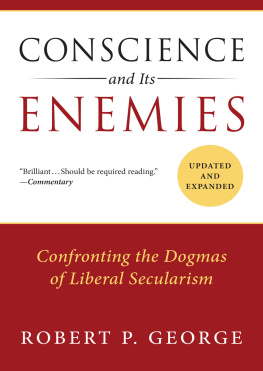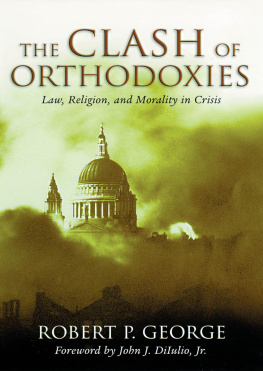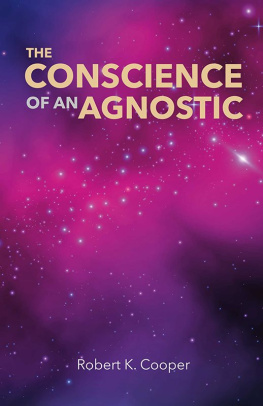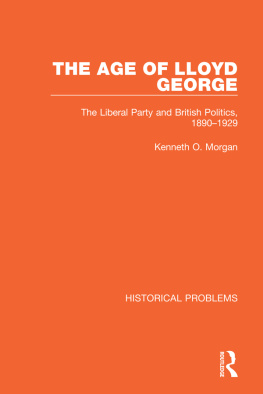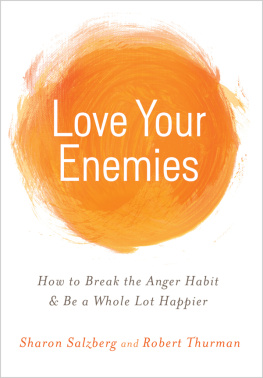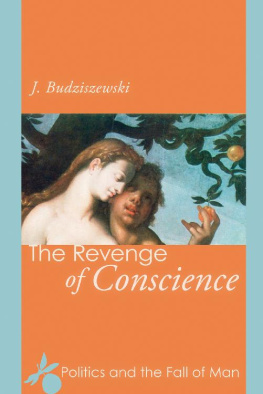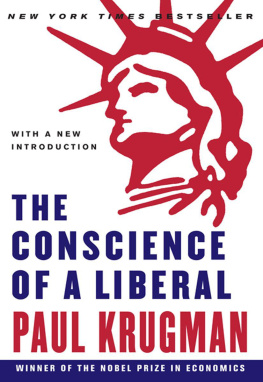American Ideals and Institutions Series
Robert P. George, series editor
Published in partnership with the James Madison Program in American Ideals and Institutions at Princeton University, this series is dedicated to exploring enduring questions of political thought and constitutional law; promoting the canon of the Western intellectual tradition as it nourishes and informs contemporary politics; and applying foundational Western principles to modern social problems.
Also available in the American Ideals and Institutions Series:
In Defense of Religious Liberty
by David Novak
A Time to Speak: Selected Writings and Arguments
by Robert H. Bork
Living Constitution, Dying Faith:
Progressivism and the New Science of Jurisprudence
by Bradley C. S. Watson
Western Culture at the American Crossroads:
Conflicts over the Nature of Science and Reason
by Arthur Pontynen and Rod Miller
The Just War Tradition: An Introduction
by David D. Corey and J. Daryl Charles
Conscience and Its Enemies
Confronting the Dogmas of Liberal Secularism
Robert P. George
Wilmington, Delaware
For
Luis Tellez
and
Joe and Debbie Duffy
Contents
Foreword to the Paperback Edition
by Mary Ann Glendon
5 Judicial Despotism
Lessons from the Great Emancipator
11 Religious Liberty
A Fundamental Human Right
19 Embryo Ethics
What Science Tells Us, What Justice Demands of Us
20 The Personal and the Political
Some Liberal Fallacies
23 Harry Blackmun
Improbable Liberal Icon
24 Andrew Sullivan
A Walking Contradiction
25 Bernard Nathanson
A Life Transformed by Truth
26 He Threw It All Away
On the Greatness of Richard John Neuhaus
27 A Practical Philosopher in Every Way
G. E. M. Anscombe
29 Elizabeth Fox-Genovese
A Life Well Lived
30 Eugene Genovese
Truth Teller
32 Antonin Scalia
An American Originalist
Foreword to the Paperback Edition
by Mary Ann Glendon
These lively essays, ranging over nearly every issue that claims public attention these days, are a perfect introduction to the fertile mind and generous spirit of the man described in a New York Times Magazine profile as the most influential Christian conservative thinker in America.
Robert George wears many hats, and they are all on display in this highly readable volume. He is a leading champion of religious freedom at home and abroad, currently serving as chairman of the United States Commission on International Religious Freedom. He is the author of highly respected scholarly works on constitutionalism and political philosophy. And he is a public intellectual, well known for his countercultural stands on a variety of social issues. Those with opposing views sometimes attempt to dismiss his more controversial positions as religious opinions. But as these essays demonstrate, it is the hallmark of Georges work that he rigorously sticks to arguments that are accessible through reasonand challenges those who disagree with him to do the same.
Reason is Georges stock in trade. He does not base his arguments on theological, religious, or emotive grounds. Instead, he brings his Oxonian philosophical training and his formidable analytical powers to bear on the assumptions that underlie the principal approaches to contemporary controversies. He subjects the competing positions to reasoned analysis, taking pains to deal fairly and sympathetically with the best arguments of persons who defend a point of view different from his. That mode of engagement has itself become countercultural, at least in circles where reason is regularly subordinated to feeling and a culture of relativism reigns. But it has earned him accolades across the political spectrum from those who share Georges conviction that conscientious truth seeking regarding the ultimate sources of meaning and value is a crucial dimension of human well-being and fulfillment.
The qualities that have won him wide admiration were well summed up by Dean (now Justice) Elena Kagan when she introduced his John Dewey Lecture at Harvard by saying: Robert George is one of the nations most respected legal theorists. His many accomplishments are due to his sheer brilliance, the analytic power of his arguments, and the range of his knowledge. But there is still more: there is a deeply principled conviction, a profound and enduring integrity.
This new edition of Conscience and Its Enemies could not be more timely. It is a treasure trove of thought-provoking reflections by one of the best minds of our time on topics ranging from the challenges of immigration, the scope and limits of judicial power, and the dilemmas of affirmative action to the meanings of liberty, the relation of law and morality, and the frontiers of bioethics. The book is particularly welcome at this moment when religious freedom is under increasing threat at home and abroad.
Mary Ann Glendon is the Learned Hand Professor of Law at Harvard University.
Introduction
Americans are deeply divided on a range of issuesnot only as to the best means for achieving agreed-upon goals but also as to the goals themselves. These issues centrally involve disputed fundamental values and moral principles. For example: Should human life be protected in all stages and conditions? Or should abortion and euthanasia be permitted and even promoted as best (or least bad) solutions to personal difficulties and social problems? Should we concern ourselves with restoring in our law and public policy the historic understanding of marriage as a conjugal unionthe partnership of husband and wife in a bond that is ordered to procreation and, where the union is blessed by children, naturally fulfilled by their having and rearing offspring together? Or should we be content with abandoning the conjugal understanding of marriage in favor of legally recognized sexual-romantic companionship or domestic partnership between two (or more) persons, irrespective of gender, to which the label marriage is reassigned?
Disputes such as these reflect the profound chasm that separates opposing worldviews. People on the competing sides use many of the same words: justice, human rights, liberty, equality, fairness, tolerance, respect, community, conscience, and the like. But they have vastly different ideas of what those terms mean. Likewise, they have radically different views of human nature, of what makes for a valuable and morally worthy way of life, and of what undermines the common good of a justly ordered community.
There is a truth all too rarely adverted to in contemporary culture war debatesnamely, that deep philosophical ideas have unavoidable and sometimes quite profound implications for public policy and public life. Anyone who takes a position on, say, the ethics of abortion and euthanasia, or the meaning and proper definition of marriage, is making philosophical (metaphysical and moral) assumptionsassumptions that are contested by people on the other side of the debate. The temptation, of course, is to suppose that Im not making any controversial assumptions; only the people on the other side are doing that. But this is absurd. All of us make philosophical assumptionsabout the human good, human nature, human dignity, and many other crucial matters. One objective of this book is to show that these assumptionsour own assumptions, not just the other guyshave important consequences, and that we should all be prepared to examine them critically.


